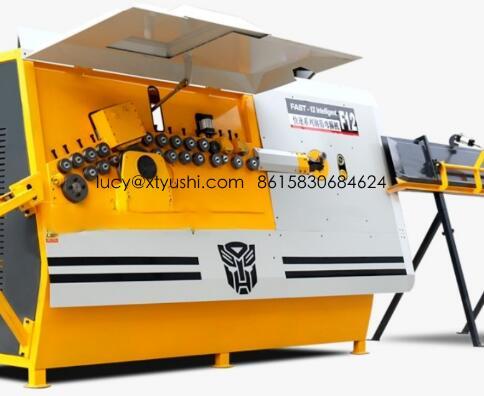A machine that precisely bends metal wire into custom shapes using controlled force and programmed bending angles, often used for manufacturing components like springs, hooks, and complex wire assemblies.
In today’s fast-paced manufacturing world, precision and efficiency are crucial for producing high-quality products. A wire bending machine plays a pivotal role in industries where forming and shaping wire into specific designs is required. These machines are used extensively in sectors such as automotive, construction, electronics, furniture, and more. But what exactly is a wire bending machine, how does it work, and why is it indispensable in modern manufacturing? This article explores the fundamental aspects of wire bending machines, their applications, and their advantages for industrial buyers.

Defining a Wire Bending Machine
A wire bending machine is an automated piece of equipment designed to form wire into various shapes, angles, and configurations. These machines can process a wide range of materials, including steel, aluminum, brass, copper, and other alloys. They are equipped with advanced controls and mechanisms that allow for high precision in bending, making them ideal for producing components like hooks, frames, springs, brackets, and other intricate shapes.
Modern wire bending machines often come with CNC (Computer Numerical Control) capabilities, enabling manufacturers to create complex wire forms with ease and accuracy. The flexibility and efficiency provided by these machines make them a preferred choice for industries looking to streamline production processes and reduce costs.
How Does a Wire Bending Machine Work?
Wire bending machines operate by feeding a continuous wire into the machine, where it is bent into specific shapes through a combination of tools, dies, and programmable control systems. Here are the key steps in the wire bending process:
1. Wire Feeding
The process begins with feeding the raw wire into the machine. This is done through automated rollers or belts that ensure consistent and smooth movement.
- Material Compatibility: The machine can handle various wire diameters, depending on its design and specifications.
- Automated Adjustment: High-end machines can adjust feeding speeds automatically to match the bending requirements.
2. Straightening
Before bending, the wire passes through a straightening mechanism to ensure it is perfectly aligned. This step is essential for producing uniform and high-quality bends.
3. Bending
The bending mechanism uses rotating tools and dies to shape the wire. CNC wire bending machines allow operators to input precise angles, radii, and dimensions for each bend.
- Multi-Axis Operation: Advanced models can bend the wire in multiple planes, enabling the creation of 3D forms.
- High Precision: CNC controls ensure that every bend meets exact specifications, minimizing errors and waste.
4. Cutting
Once the wire is bent into the desired shape, it is cut to the appropriate length. Automated cutting systems ensure clean and accurate cuts, improving the overall quality of the product.
Applications of Wire Bending Machines
Wire bending machines are widely used in various industries due to their versatility and efficiency. Here are some of the most common applications:
- Automotive Industry: Producing wire components such as brackets, clamps, and suspension springs.
- Construction: Forming rebar ties, hooks, and other structural components.
- Furniture Manufacturing: Creating frames, legs, and decorative elements.
- Electronics: Producing wire forms for circuit boards and electrical enclosures.
- Retail Displays: Shaping wire for racks, shelves, and display stands.
- Medical Devices: Manufacturing precision wire forms for surgical instruments and equipment.
Advantages of Using a Wire Bending Machine
- High Precision and Consistency: CNC wire bending machines provide exceptional accuracy, ensuring that every product meets strict quality standards.
- Increased Efficiency: Automated wire bending machines can process large quantities of wire in a short time, significantly boosting productivity.
- Cost Savings: By reducing material waste and minimizing labor costs, wire bending machines offer a cost-effective solution for manufacturers.
- Versatility: Wire bending machines can handle a wide range of materials and wire diameters, making them suitable for diverse applications.
- Improved Safety: Automation reduces the need for manual handling, lowering the risk of workplace injuries.
Why Choose JUSHI Wire Bending Machines?
With over a decade of experience in manufacturing advanced industrial equipment, JUSHI is a trusted name in the wire bending machine industry. Our machines are designed to deliver exceptional performance, precision, and durability. Equipped with the latest CNC technology, JUSHI wire bending machines offer unparalleled versatility and efficiency, helping manufacturers achieve their production goals.
Industry Insights
According to recent industry reports, the global market for wire bending machines is expected to grow at a compound annual growth rate (CAGR) of 5.8% over the next decade. This growth is driven by increasing demand for customized wire products in construction, automotive, and consumer goods sectors. As manufacturers look to automate their production lines, the adoption of CNC wire bending machines is set to rise significantly.






